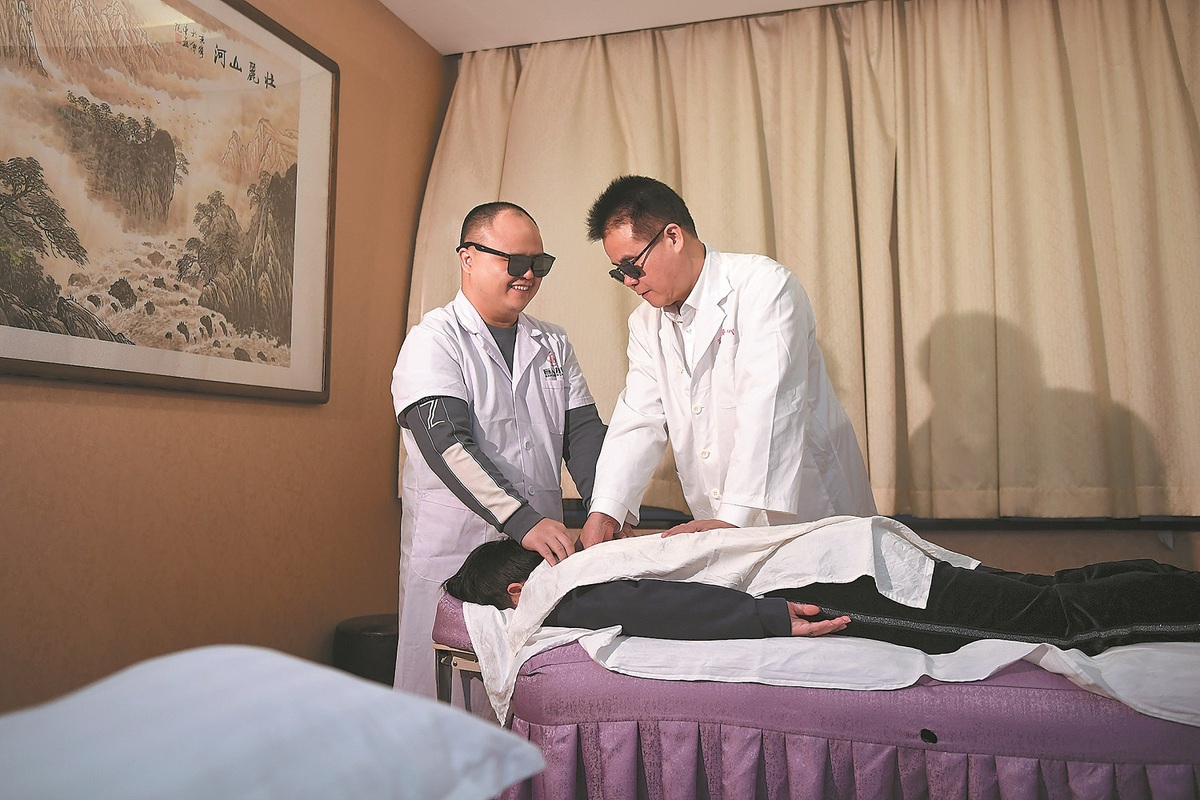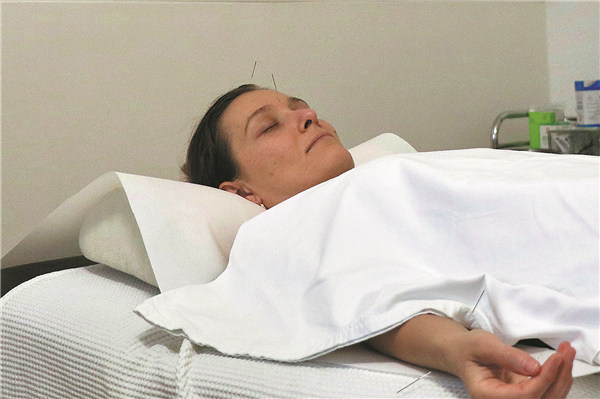按摩 Getting a massage in China
That's Mandarin 2024-02-28 16:44


Massage, or 按摩 (àn mó), is a very popular type of therapy in China among locals and foreigners alike.
Learning about the different types of massage and their Chinese names can help you choose the perfect one at a Chinese massage salon. Let's check them out!
按摩 Massage
In Chinese, massage is known as "按摩" (àn mó), where "按" (àn) means "to press", and "摩" (mó) means "to rub".
按摩
àn mó
massage
How to Find a Massage Place
The best way to find a good massage place, 按摩店 (àn mó diàn) is to simply ask — your teacher, colleagues, local or expat friends — to recommend you one. You can also try searching for "SPA" or "按摩 (àn mó)" on Dianping (大眾點評, dà zhòng diǎn píng) or Baidu (百度, bǎi dù), and then refine your search by rating, price, or location nearby.
Choose Your Type of Massage
In China, you can experience a variety of massages, each offering unique benefits for relaxation and wellness. Choose one based on what you like:
01. Tuina, or Pressure Point Massage

推拿 (tuī ná), is an ancient Chinese massage that's been practiced for thousands of years. It's believed to be the oldest system of bodywork - along with acupuncture (針灸, zhēn jiǔ), qigong (氣功, qì gōng), and Chinese herbal medicine (中草藥, zhōng cǎo yào).
推拿
tuī ná
pressure point massage
Literally: "push-pull"
It is based on the theory that imbalances of 氣 (qì), body's vital source of energy, can create blockages and imbalances, which in turn can cause pain and illness. Thus, tuina massage stimulates the flow of 氣 (qì) to promote balance and harmony within the body.
NOTE
Tuina is a safe and common type of massage in China, but remember that it's not a gentle or relaxing massage. You may feel some discomfort during or after a session. At the same time, if you wake up with a stiff neck (落枕 lào zhěn), tuina would be a good remedy (治療/療法, zhì liáo / liáo fǎ).
02. Blind Massage
It's thought that blind people have an enhanced sense of touch which compensates for their blindness, which makes them better masseurs, good at finding muscle knots (肌肉結(jié)節(jié), jī ròu jié jié).
盲人按摩
máng rén àn mó
blind massage
Literally: "blind-person-massage"
There is nothing shady about it; such massage places are run legally. For hundreds of years, blind people all over China have found employment as massage therapists.
NOTE
The phrase 盲人按摩 (máng rén àn mó) often appears in the name of the massage parlor, so you can search for it on Dianping or Baidu Maps.
03. Foot Massage
Foot massage, known as 足部按摩 (zú bù àn mó) in Chinese, is a popular form of massage therapy. It is based on the belief that specific points on the feet correspond to different parts of the body, and by stimulating these points, it can promote health and well-being.
足部按摩
zú bù àn mó
foot massage
Literally: "foot-part-massage"
04. Oil Massage
Oil massage, or 精油按摩 (jīng yóu àn mó), is known for its ability to relieve stress (緩解壓力, huǎn jiě yā lì) , reduce muscle tension (減少肌肉緊張, jiǎn shǎo jī ròu jǐn zhāng), and improve flexibility (提高柔韌性, tí gāo róu rèn xìng). It is also believed to have a range of other health benefits, such as boosting the immune system (提高免疫力, tí gāo miǎn yì lì), improving sleep quality (改善睡眠質(zhì)量, gǎi shàn shuì mián zhì liàng), and promoting detoxification (促進(jìn)排毒, cù jìn pái dú).
精油按摩
jīng yóu àn mó
oil massage
Literally: "essential-oil-massage"
NOTE
Please note that oil massage can vary in intensity. If you go to a place that specializes in TCM-style massage, your experience will be much more intense. This kind of massage is called "meridian" therapy, which helps relieve muscle tension using essential oils.
精油經(jīng)絡(luò)療法
jīng yóu jīng luò liáo fǎ
hot meridian oil physical therapy
Literally: "oil-meridian therapy"
05. Head Massage & Shoulder Massage
If you don't like a full-body massage (全身按摩 quán shēn àn mó), consider a head or shoulder massage. These treatments focus on relieving tension in specific areas like the neck, shoulders, and head, offering a more localized yet deeply relaxing experience.
頭部按摩
tóu bù àn mó
head massage
Literally: "head-part-massage"
肩頸按摩
jiān jǐng àn mó
shoulder and neck massage
Literally: "shoulder-neck-massage"
NOTE
Keep in mind that head and shoulder massages are typically shorter in duration compared to full-body massages.
06. Hot Stone Massage
One more technique of massage that offers relaxing experience is 熱石按摩 (rè shí àn mó), also known as hot stone massage.
The stones are placed on specific points on the body to warm and loosen tight muscles and balance energy centers in the body.
熱石按摩
rè shí àn mó
hot stone massage
Literally: "hot-stone-massage"
NOTE
If you're concerned about high temperatures, don't worry - during a hot stone massage, the therapist will heat the stones to a comfortable temperature that won't cause discomfort. If at any point during the massage you feel that the stones are too hot, you can always let your therapist know by saying:
有點兒熱,可以調(diào)低一點兒溫度嗎?
Yǒu diǎnr rè, kě yǐ tiáo dī yī diǎnr wēn dù ma?
It's a bit hot. Can you lower the temperature?
Worth Trying: 采耳
If you've ever walked by a massage salon, you might have noticed a treatment with the character 耳 (ěr) in its name, which refers to the traditional practice of 采耳 (cǎi ěr), or ear scooping. 采耳 is believed to have originated thousands of years ago and is still practiced in some parts of China.
采耳
cǎi ěr
ear scooping
Literally: "to pick-ear"
During a 采耳 (cǎi ěr) session, a small, scoop-shaped tool called an 耳勺 (ěr sháo) is used to gently scrape and scoop out earwax from the ear canal.
Some people find the sensation of having their ears cleaned to be soothing and calming. Have you ever tried this treatment in China?
Useful Phrases for Your Massage Session
If you feel uncomfortable during a massage session, you can politely ask the massage therapist to lighten the pressure by saying:
有點兒疼,你可以輕一點兒嗎?
Yǒu diǎnr téng, nǐ kě yǐ qīng yī diǎnr ma?
It hurts a little. Can you be gentler?
If you want the therapist to press harder on specific areas, you can say:
你可以幫我多按幾下嗎?
Nǐ kě yǐ bāng wǒ duō àn jǐ xià ma?
Can you press it a few more times?
重一點兒。
Zhòng yī diǎnr.
A bit heavier.
來源:That's Mandarin
編輯:萬月英

















 英語點津微信
英語點津微信 雙語小程序
雙語小程序